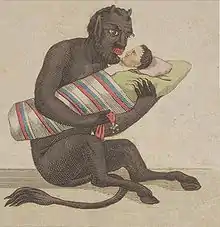שד
See also: שד׳
Hebrew
Etymology 1

From Proto-Semitic *ṯdʾ (“breast, pap, teat”). Cognate with Arabic ثَدْي (ṯady, “breast”) and Aramaic תַּדָּא (“breast”).
Pronunciation
- (Modern Israeli Hebrew) IPA(key): /ʃad/
See also
- ציצי (tsitsi)
References
- H7699 in Strong, James (1979) Strong’s Exhaustive Concordance to the Bible
- “שד” in the Hebrew Terms Database of the Academy of Hebrew Language
Further reading
 שד (איבר) on the Hebrew Wikipedia.Wikipedia he
שד (איבר) on the Hebrew Wikipedia.Wikipedia he
Etymology 2

| Root |
|---|
| שׁ־ו־ד (š-w-d) |
Compare Aramaic ܫܐܕܐ (šēḏā) and Akkadian 𒀭𒆘 (šēdum, “a protective deity”), from which the former derives.
Pronunciation
- (Modern Israeli Hebrew) IPA(key): /ʃed/
Noun
שֵׁד • (shed) m (plural indefinite שֵׁדִים, feminine counterpart שֵׁדָה)
Derived terms
- שֵׁדִי (shedí)
References
Further reading
 שד (מיתולוגיה) on the Hebrew Wikipedia.Wikipedia he
שד (מיתולוגיה) on the Hebrew Wikipedia.Wikipedia he
Anagrams
- ד״ש
Yiddish
Alternative forms
- שעד (shed) – Soviet phonetic spelling
Pronunciation
- Homophone: שייד (sheyd)
This article is issued from Wiktionary. The text is licensed under Creative Commons - Attribution - Sharealike. Additional terms may apply for the media files.